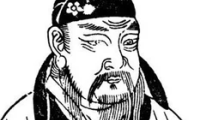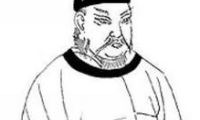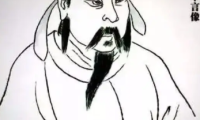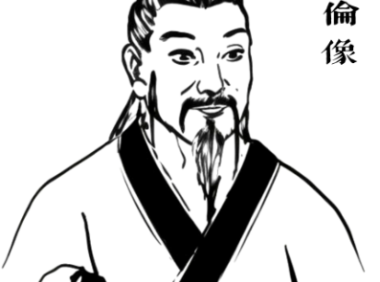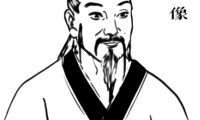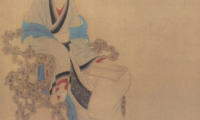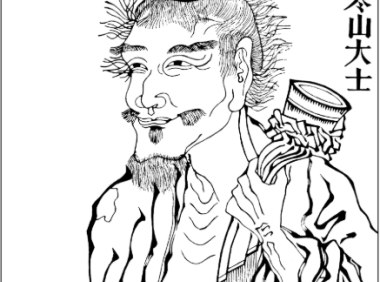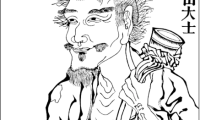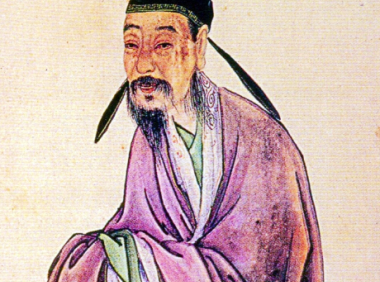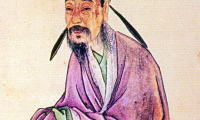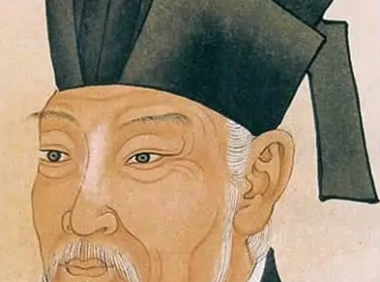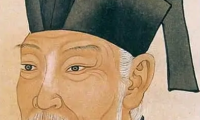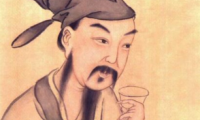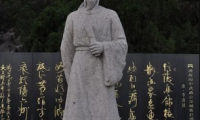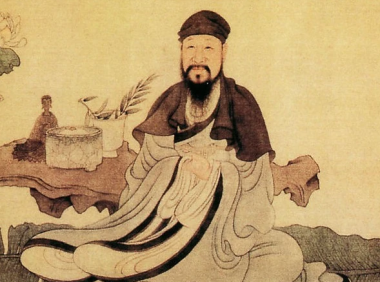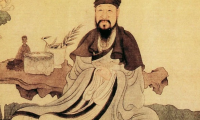-
Wang Ya: “Song of Spring Journeying”
春游曲二首(录一) 王涯 万树江边杏,新开一夜风。 满园深浅色,照在绿波中。 “Song of Spring Journeying” Wang Ya Ten thousand almond trees by the riverbank Burst freely into bloom after one night’s wind. All over the park, colors dark and light Are reflected there in the green waves. (No. 1 from A Series of 2) (Irving Y. Lo 译)...
- 0
- 0
- 79
-
Li Hsün: “Sand of Silk-Washing Stream” (Huan-ch’i sha)
浣溪沙 李珣 其一 入夏偏宜澹薄妆,越罗衣褪郁金黄,翠钿檀注助容光。 相见无言还有恨,几回判却又思量,月窗香径梦悠飏。 “Sand of Silk-Washing Stream” (Huan-ch’i sha) Li Hsün 1 The daintiness of her attire is especially nice in summer. Her Yüeh silk gown is lightly yellow, the color of turmeric. Azure patches and crimson lips enhance her beautiful face. She says nothing of her bitterness when they are together. But every time they part, she thinks of him over and over. By a moonlit window, the path smells sweet, she dreams on. (Lois Fusek 译)...
- 0
- 0
- 57
-
Wei Zhuang: Tune: “Pu Sa Man” Dreaming in Autumn
菩萨蛮 韦庄 红楼别夜堪惆怅, 香灯半卷流苏帐。 残月出门时, 美人和泪辞。 琵琶金翠羽, 弦上黄莺语。 劝我早归家, 绿窗人似花。 Tune: “Pu Sa Man” Dreaming in Autumn Wei Zhuang How can one not be sad in a red chamber on parting night? The tasseled canopy was half closed in scented lamplight. The waning moon was still hanging when I left home. With tears in her eyes, she said good-bye. She played the pipa decorated with a golden-green feather. She plucked the strings in oriole language for me to decipher. She advised me to return home soon. For the person by the green window would be like a flower in bloom. (Edward C. Chang 译) Pu’ Sa Man (To the Tune-title ‘The Strange Goddesses’) Wei Zhuang North and South I Parting at night in the upper room what preys to grief we were – Lamp-lit fragrance and those half-rolled tasseled curtains there. The moon was waning as I left the house; Your beauty shone in every farewell tear. Your gilt guitar, king-fisher blue inlaid, Its strings a golden-oriole’s serenade, Urged me to come back soon, to come back soon To the green-gauze window veiling a flower-fresh maid. (Duncan Mackintosh, Ch’eng His and T’ung Ping-Cheng 译)...
- 0
- 0
- 64
-
Du Shenyan: Excursion in Early Spring ~《和晋陵陆丞早春游望》 杜审言 with English Translations
"Replying to Lu Cheng of Jinling on Early Spring Tour" is a work by Tang Dynasty poet Du Shenyan. This poem describes the poet's sadness of being unable to return home when he was on a business trip in a foreign land. The poem begins with a sigh, explaining that when one is away from home and on a business trip, one is "surprised" by the "phenology" of a foreign land. The middle two couplets specifically describe the "surprise", describing the scenery of the new spring in the south of the Yangtze River, and the poet's nostalgia for his hometown in the Central Plains. The last couplet points out the longing for home and expresses his original intention of being sad about the spring. This is a poem written in response to the poet's wishes, using personification to describe the early spring in the south of the Yangtze River, which is as vivid as a painting. The parallelism is neat, the structure is fine, and every word is polished. 《和晋陵陆丞早春游望》是唐代诗人杜审言的作品。此诗写诗人宦游他乡,春光满地不能归省的伤情。诗一开头就发出感慨,说明离乡宦游,对异土之“物候”才有“惊新”之意。中间二联具体写“惊新”,写江南新春景色,诗人怀念中原故土的情意。尾联点明思归和道出自己伤春的本意。这是一首和诗,采用拟人手法,写江南早春,历历如画。对仗工整,结构细密,字字锤炼。 《和晋陵陆丞早春游望》 杜审言 独有宦游人,偏惊物候新。云霞出海曙,梅柳渡江春。淑气催黄鸟,晴光转绿蘋。忽闻歌古调,归思欲沾巾。 Excursion in Early Spring Du Shenyan I'm far away from home;Things look new where I roam.Clouds bring dawn on the sea;Spring greens the willow tree.Orioles sing in…...
- 0
- 0
- 58
-
Dai Shulun: The Temple of Qu Yuan ~ 《过三闾庙》 戴叔伦 with English Translations
"Passing by Sanlu Temple" is a five-character quatrain written by Dai Shulun, a poet in the Tang Dynasty. The poem expresses his compassion and sympathy for Qu Yuan. The whole poem recalls the past and revolves around the word "resentment". The language is clear, the poetry is implicit, and the poem is profound and meaningful, which has won praise from poetry critics of all generations. 《过三闾庙》是唐代诗人戴叔伦所写的一首五言绝句。该诗表达了对屈原的悲悯和同情。全诗抚今追昔,紧紧围绕“怨”字下笔,语言明朗,诗意含蓄,隽永深远,深得历代诗评家的赞誉。 《过三闾庙》 戴叔伦 沅湘流不尽,屈子怨何深!日暮秋风起,潇潇枫树林。 The Temple of Qu Yuan Dai Shulun Rivers Xiang and Yuan seem to weepOver the poet's sorrow deep.At dusk rises the autumn breeze;Leaves on leaves fall from maple trees....
- 0
- 0
- 61
-
Yu Hsuan-chi: Composed on the Theme “Willows by the Riverside” ~ 《赋得江边柳》 鱼玄机 with English Translations
"Fude Jiangbianliu" is a work by the Tang Dynasty poet Yu Xuanji. The first four lines of this poem depict a beautiful and misty picture of willows by the river: green stretches to the bank, willow smoke covers the distant building, shadows spread over the water, and flowers fall on people's heads; the last four lines turn from the above description to the description of unfortunate circumstances and sorrow, writing about the roots of the willow trees deeply hidden in the fish cellar under the water, the willow branches reluctantly tying up the guest boat, and the night of wind and rain, waking up from a dream and adding a bit of sorrow. The whole poem blends the scene and the mood, with twists and turns, and beautiful artistic conception. It is a superior work of describing the scene and expressing emotions. 《赋得江边柳》是唐代女诗人鱼玄机的作品。此诗前四句描绘了一幅美丽迷蒙的江边烟柳图:翠色连岸,柳烟远楼,影铺水面,花落人头;后四句由上面的写景,转入书写不幸的际遇和的愁情,写柳树的根深深的藏在水底鱼窖,柳枝依依不舍系住客舟,风雨潇潇的夜晚,从梦中惊醒又增添几许愁绪。全诗情景交融,曲折有致,意境优美,是写景抒情的上乘之作。 《赋得江边柳》 鱼玄机 翠色连荒岸,烟姿入远楼。影铺秋水面,花落钓人头。根老藏鱼窟,枝低系客舟。萧萧风雨夜,惊梦复添愁。 Composed on the Theme "Willows by the Riverside" Yu Hsuan-chi Kingfisher green lines the deserted shore,the misty vision stretches to a distant tower.Their shadows overspread the autumn-clear waterand catkins fall on the angler’s head.Old foots form hollows where fish hide;limbs reach down to moor the traveler’s boat.Soughing, soughing in the wind and rain of…...
- 0
- 0
- 56
-
寒山·《极目兮长望》 with English Translations
I tried my best to open my eyes and look into the distance, only to see white clouds all around me, which I couldn't see clearly. The falcon and crow are bloated and unable to fly high, while the phoenix and the phoenix suffer from hunger and wander aimlessly. The galloping horse was exiled to the barren Gobi Desert without water or grass, while the lame donkey was led to the high court committee and entrusted with important tasks. I want to ask the heavens why there are so many injustices in the world, but the heavens are high above and unable to ask, so they can only watch the wrens fly freely on the river and sea. 大意:我尽力的张开双眼眺望远方,只见四周白云弥漫看不清楚。鹞鹰和乌鸦都吃得饱饱的臃肿得无法高飞,鸾鸟和凤凰却忍饥挨饿彷徨不定。骏马被放逐在无水无草的戈壁滩,跛脚的毛驴却被牵到高堂委与重任。我想要问问苍天,人间为什么这么多不平事,但苍天高高在上无法追问,只好看着鹪鹩自由自在的飞翔在江海之上。 寒山·《极目兮长望》 极目兮长望,白云四茫茫。 鸱鸦饱腲腇,鸾凤饥彷徨。 骏马放石碛,蹇驴能至堂。 天高不可问,鹪鵊在沧浪。 A Traveler Brings Messages, Waiting While I Read From my heights I stare into an opaque sky; Thick clouds, though white, obscure the lower peaks. These rumors abound: the carrion crow eats fresh meat; The phoenix pecks for grubs from village to village; Horses fast as wind are exiled via pitted roads; They pass donkeys bearing empty vessels to court. The dense clouds say, "Do not ask Heaven why.” Yet we nesting birds are cast into…...
- 0
- 0
- 73
-
Wang Wei: His Life
Wang Wei Wang Wei: His Life Wang Wei was born during the golden years of the Tang Dynasty, in the current city of Puxian, province of Shanxi, in 701, into an aristocratic family. His father, grandfather and great grandfather were all government officials. His mother belonged to a prominent family as well. Wang had at least four younger brothers and one younger sister. Wang’s family background helped especially during the second part of his life, but in the beginning of his governmental career it was more of a hindrance to his advancement. Wang Wei came of age during the reign of emperor Xuanzong, who ruled from 712 to 756. Academically he was a child prodigy. By the age of fifteen Wang went to the capital Chang’an (modern day Xi’an) to study with the famous and well known teachers in order to pass the imperial examinations needed to be assigned a government position. He wrote his first poem in 718 at the age of seventeen. In 720 he sat for the regional examinations, and passed with the highest score. This qualified him to sit for the most difficult test, the jinshi, taken in the capital during the early part of each year by several thousand candidates. Only…...
- 0
- 0
- 110
-
Wang Wei: In Spring the Fragrant Grass ~ with English Translations
Wang Wei 小编导读:诗歌表现辋川风光和自己生活其间的安闲自在,采用的是以少概多的描写笔法,一句一景,就象一幅幅图画一样,这些画面连接在一起,构成了含蕴丰富的“辋川闲居图”。 Editor's note: The poem expresses the scenery of Wangchuan and the leisurely and comfortable life of the poet himself there. It adopts a descriptive style of using the few to describe the many, with each sentence describing one scene, just like a series of pictures. These pictures are connected together to form the "Wangchuan Leisurely Life Picture" which is rich in connotation. 《凄凄芳草》 王维 萋萋芳草春绿,落落长松夏寒。牛羊自归村巷,童稚不识衣冠。 In Spring the Fragrant Grass In spring the fragrant grass is green and lushly spread,In summer pines shoot high and straight with chilly shade.The sheep and cows return to the lanes by no one led,And children at official raiment aren't afraid....
- 0
- 0
- 49
-
Wang Wei: Retiring to Mount Songshan ~ 《归嵩山作》 王维 with English Translations
Wang Wei 小编导读:《归嵩山作》是唐代诗人王维所写的一首五言律诗。此诗通过描写作者辞官归隐嵩山途中所见的景色,抒发了作者恬静淡泊的闲适心情。 Editor's Note: "Written on Returning to Mount Song" is a five-character regulated verse written by Wang Wei, a poet of the Tang Dynasty. This poem expresses the author's tranquil and leisurely mood by describing the scenery he saw on his way to Mount Song after resigning from his official position. 《归嵩山作》 王维 清川带长薄,车马去闲闲。流水如有意,暮禽相与还。荒城临古渡,落日满秋山。迢递嵩高下,归来且闭关。 Retiring to Mount Songshan The limpid stream is lined with green on green,Both horse and carriage move at a leisurely pace.The waters seem to flow at their own sweet will,The birds at dusk all flock to their resting place.An abandoned ferry, a ruined town: what a scene!The sunset glow sets autumn hills ablaze.Away at the foot of Songshan, quiet and still,I will retire behind closed doors—there’s my space!...
- 0
- 0
- 70
-
Wang Wei: Visit to the Stone-Gage Temple in the Sapphire Mountains ~《蓝田山石门精舍》 王维 with English Translations
Wang Wei 小编导读:这是一首纪游诗,描写游蓝田山石门精舍(佛寺)的经过。作于诗人晚年隐居蓝田山中的辋川别墅时。这首诗一起笔就透出诗人特别轻松、快适。 Editor's Note: This is a travel poem describing the experience of visiting Shimen Jingshe (Buddhist temple) in Lantian Mountain. It was written when the poet lived in seclusion in Wangchuan Villa in Lantian Mountain in his later years. From the beginning of this poem, the poet is particularly relaxed and comfortable. 《蓝田山石门精舍》 王维 落日山水好,漾舟信归风。玩奇不觉远,因以缘源穷。遥爱云木秀,初疑路不同。安知清流转,偶与前山通。舍舟理轻策,果然惬所适。老僧四五人,逍遥荫松柏。朝梵林未曙,夜禅山更寂。道心及牧童,世事问樵客。暝宿长林下,焚香卧瑶席。涧芳袭人衣,山月映石壁。再寻畏迷误,明发更登历。笑谢桃源人,花红复来觌。 Visit to the Stone-Gage Temple in the Sapphire Mountains With the sunset hills and streams aglow,I sailed as far as the wind would blow.Since curious minds made distance light,I'd trace upstream to the source on the height.Lush trees far yonder reached the clouds.The limpid curled through mountain crowdsTill O, who'd have thought, this ridge so fair!I left the boat and walked with a stick:Indeed it was nice where'er I'd pick!Some elderly monks were, under a pine,Enjoying the shade both cool and fine.Ere dawn the sutras were sung with a will,And the sitting at night made the mountains more still.E'en a cowherd boy seemed part of the holy joy,The woodman alone knew the outside world!The nights were passed in the forest vastWith incense burning and mats clean, unfurled.My clothes smelt sweet—from the gullyside flowers,And the stone-wall shone in the moonlight showers.In case I'd be…...
- 0
- 0
- 84
-
Bai Juyi: Jingzhao Prefecture Fresh Growing Lotus
Bai Juyi Jingzhao Prefecture Fresh Growing Lotus 京北府新栽莲 污 沟 贮 浊 水水 上 叶 田 田。我 来 一 长 叹知 是 东 溪 莲。 下 有 清 泥 污馨 香 无 复 全。上 有 红 尘 扑颜 色 不 得 鲜。 物 性 犹 如 此人 事 亦 宜 然。托 根 非 其 所不 如 遭 弃 捐。 昔 在 溪 中 日花 叶 媚 清 涟。今 来 不 得 地樵 悴 府 门 前。 Jing Bei Fu Xin Zai Lian Wu gou zhu zhuo shuiShui shang ye tian tian.Wo lai yi chang tanZhi shi dong xi lian. Xia you qing nu wuXin siang wu fu quan.Shang you hong chen puYan se bu de xian. Wu xing you ru ciRen shi yi yi ran.Tuo gen fei qi suoBu ru zao qi juan. Xi zai xi zhong riHua ye mei qing lian.Jin lai bu de diQiao cui fu men qian. Jingzhao Prefecture Fresh Growing Lotus Stagnant and muddy waterLotus leaves above small cultivated fields.I arrive and produce one long chantKnow of some lotus on small eastern streams. Below have clear water and soft mudWithout their strong and pervasive fragrances.On top, their leaves hold the red dustColors and expressions not fresh…...
- 0
- 0
- 19
-
Du Mu: Lanxi City
Du Mu Lanxi City 兰溪 兰 溪 春 尽 碧 泱 泱映 水 兰 花 雨 发 香。 楚 国 大 夫 憔 悴 日应 寻 此 路 去 潇 湘。 LanXi Lan xi chun jin bi yang yangYing shui lan hua fa xiang. Chu guo da fu qiao cui riYing xun ci lu qu xiao xiang. Lanxi City Springtime in Lanxi very bluish-green, vast and magnificentReflected water, orchid blossoms and raindrops emit their fragrances. Remember the horrible day when the Chu nation lost Chu YuanShould look for the way to depart on the Xiao and Xiang tributaries. Notes: Lanxi: City in Zhejiang Province. Chu Yuan: (ca. 340-278 BC) Also known with the spelling of Qu Yuan. Famous poet and politician noted for his patriotism, poem mastery, and committing suicide by throwing himself in a river, which lead to the Dragon Boat Festival. Xiao and Xiang: Two rivers that flow into the Changjiang and Dongting Lake. This…...
- 0
- 0
- 23
-
Du Mu: Beginning of Spring, Send This Letter of Feelings to Xizhou For Ministry Counselor Xing
Du Mu Beginning of Spring, Send This Letter of Feelings to Xizhou For Ministry Counselor Xing 初春有感寄歙州邢员外 雪 涨 前 溪 水啼 声 已 绕 滩。梅 衰 未 减 态春 嫩 不 禁 寒。 迹 去 梦 一 觉年 来 事 百 般。闻 君 亦 多 感何 处 倚 阑 干。 Chu Chun You Gan Ji Xi Zhou Xing Yuan Wai Xue zhang qian xi shuiTi sheng yi rao tan.Mei shuai wei jian tai.Chun nen bu jin han. Ji qu meng yi jueNian lai shi bai ban.Wen jun yi duo ganHe chu yi lan gan. Beginning of Spring, Send This Letter of Feelings to Xizhou For Ministry Counselor Xing Snow melt causes the Qian River to riseCoiling around a river shoal, water sounds like someone crying.Plum tree flowers decline, not yet a barren appearanceSpring delicate natures cannot endure the cold. Traces of what has departed, one dream awakensAnother year arrives, a hundred troubled affairs in the past.Heard you also have many of these feelings and insightsWhere are you going to ponder the crossroads of life. Notes: Xizhou: A city north of Dali in the province of Yunnan. Qian River: Tributary to the Xiang river in Hunan Province....
- 0
- 0
- 13
-
Li Shangyin’s Poetry – 李商隐《碧城(三首其一)》
"Bicheng" (three poems) is one of the most difficult to understand poems of Li Shangyin, and there have been many different opinions....
- 0
- 0
- 46
-
Li Shangyin’s Poetry – 李商隐《隋宫 (隋堤)》
Reading this poem in comparison with the seven-character regulated verse "Sui Palace", one can feel the difference between regulated verse and quatrain. R...
- 0
- 0
- 15
-
Li Shangyin’s Poetry – 李商隐《杜司勋(牧)》
On a windy and rainy day, Li Shangyin went up to the tower and admired Du Mu's poems and essays, appreciating his talent and lamenting his fate. He was talking about Du Mu as well as himself....
- 0
- 0
- 42
-
Zheng Gu Poem: To the Crabapple Flower – 郑谷《海棠》
Zheng Gu 海棠 郑谷 春风用意匀颜色, 销得[1]携觞[2]与赋诗。 秾[3]丽最宜新著雨, 娇娆全在欲开时。 莫愁[4]粉黛临窗懒, 梁广[5]丹青点笔迟。 朝醉暮吟看不足, 羡他蝴蝶宿深枝。 注释: [1] 销得:这里是值得的意思。 [2] 觞(shānɡ):古代称酒杯。 [3] 秾(nónɡ):草木茂盛。 [4] 莫愁:古代一个洛阳女子的名字。 [5] 梁广:中唐著名的花鸟画家,李群玉《长沙元门寺张员外壁画》称:“世人只爱黄花鸟,无处不知梁广名。” To the Crabapple Flower Zheng Gu The vernal breeze has brightened your color so fine; You stir my mind to write a verse before good wine. With rain impearled on you, more beautiful you grow; You’re all the more bewitching when about to blow. The fair forgets to powder her face before you; The painter hesitates to draw your picture new. Nor verse nor wine’s enough to show delight in me; I envy butterflies perching deep in your tree. The artist’s attitude reveals the beauty of the crabapple flower....
- 0
- 0
- 90
Checking in, please wait...
Click for today's check-in bonus!
You have earned {{mission.data.mission.credit}} points today
My Coupons
-
¥CouponsLimitation of use:Expired and UnavailableLimitation of use:
before
Limitation of use:Permanently validCoupon ID:×Available for the following products: Available for the following products categories: Unrestricted use:Available for all products and product types
No coupons available!
Unverify
Daily tasks completed















